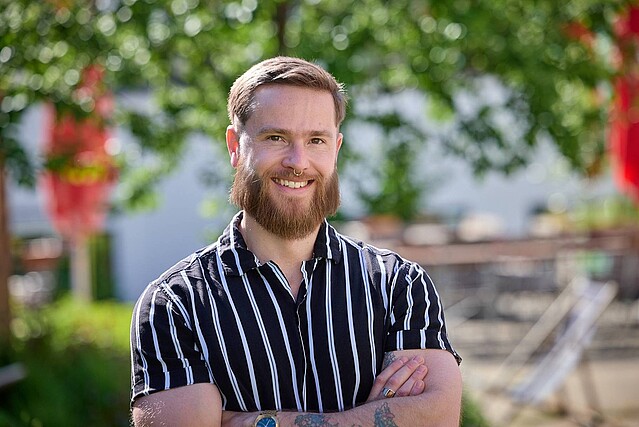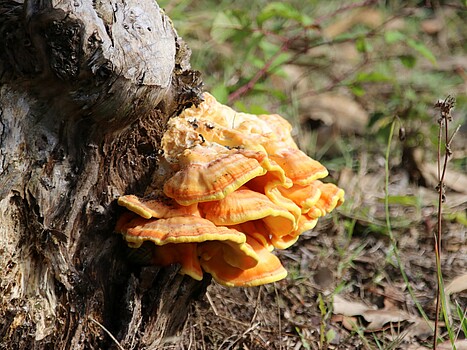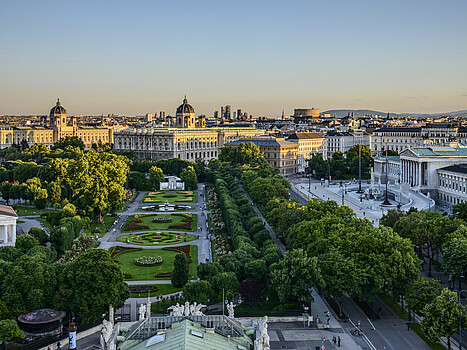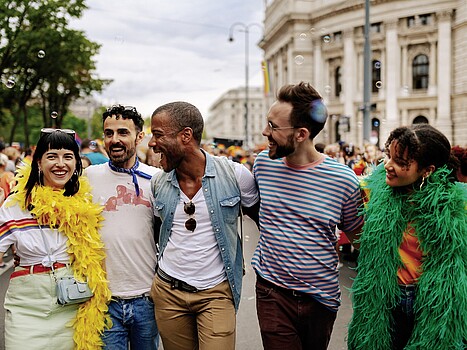Let's meet Mark Anthony, microbiome scientist
September 25, 2025|TA
A move to Vienna, thanks to the WWTF, made Dr. Mark Anthony's dream of having his own research group possible.
Watch: Dr. Mark Anthony tells the story of how he came to research and live in Vienna.
Video by Vienna Business Agency, Melchers Media
Mark Anthony is fascinated by fungi. As an Assistant Professor at the University of Vienna, his research focuses on how microbes shape the lives of plants - from their reproduction and growth to death. Fungi are the most biodiverse group of eukaryotes (any cell or organism that possesses a clearly defined nucleus) on earth, and every plant on the planet is host to a (mostly) hidden and diverse collection of fungi - not just harmful ones, but ones which can benefit a plant by supporting its health. Mark's research explores these compex interactions to address basic scientific questions, such as the ecological value of biodiversity and symbiosis.
“There is so much potential in studying fungi to transform the field of biology and to advance planetary health in the face of the biodiversity and climate crises,” he believes. Through his work, we can learn how to make forests more resilient to stressors like climate change and invasive species, as well as enhance ecosystem restoration.
“I stand on the shoulders of some giants who paved the way, like Christian Doppler, Max Perutz, and Lise Meitner.”
“The scientific community is very impressive in Vienna, and I am humbled to be part of it.”
Mark's journey to Vienna began when he was awarded a Vienna Research Group Award by the Vienna Science and Technology Fund (WWTF) to build an independent research group. Receiving this proposal allowed him to start as a tenure-track assistant professor at the University of Vienna. The sheer volume of reseach and discovery happening fuels a huge amount of collaboration and connection between universities and research institutes, such as the Vienna BioCenter, here in Vienna. This makes it possible to get resources and support without long chains of communication so researchers can simply get on with their work.
“Vienna as a city has such a rich culture of scholarship and critical thinking, from the arts to the sciences.”
What has made Vienna such a hub for life sciences? Between its extremely high quality of life and strong scientific funding landscape, Mark believe that researchers feel right at home here. The support from the city for startups and industry growth enriches the private life sciences sector, too. A long and illustrious history of valuing progress and knowledge has helped build a society which enables life sciences to prosper.
“I feel like I am part of something magical.”
The city's storied history is something Mark appreciates also away from the lab - the classic architecture, Baroque palaces, gothic churches and world-renowned museums inspire him and make the mundane magical. Within moments, you can be transported from the historic centre to revilatlising nature. For him, Vienna really does put the life in life sciences!
"Vienna as a city is very inclusive and accessible, and it is home to a large and diverse international population."
Truthfully, before being awarded his Research Group award, Mark had never really given much thought to Vienna as a place to live. So, when he arrived, he was positively surprised by many things - in particular the social responsibility which binds the city together. The diverse and international population of Vienna has resulted in an open and supportive community, which is reflected in Mark's workplace at the Universtiy of Vienna. From Pride events to the Science Ball, diving into everything Vienna has to offer revealed a city which effortlessly blends tradition with modernity, and world-class cultural offerings with a congenial attitude towards recreation.
A weight was lifted from Mark's mind when he discovered that the Vienna Business Agency could also support his husband, who works in the commercial art space, with in finding a job. For him, Vienna is a place where not only his scientific career can grow and prosper, but where his partner's professional aspirations can also be fulfilled.
"If you're looking for a good quality of life without compromising on pursuing big goals, then it doesn’t get much better than Vienna."
Mark encourages any of his fellow Americans considering a move to Vienna to come and visit, and let the city win them over. Thanks to a true equilibrium between work and play - the Viennese take their work-life balance seriously - here is the place to get the most out of life.
In the 1.5 years he's been here, the scientist has been busy conducting his own recreational research into the nature in and around Vienna. From the Botanical Gardens in the inner city, bursting with an abundence of trees and plants, to the haven which is the Danube Island, it's the accessiblity to the great outdoors which makes Vienna stand out. In the morning he can ride his bike along the trails in the tranquil Wienerwald, and come lunchtime be savouring a Sachertorte in the Museum of Art History's opulanet café with a friend.
And how could one describe living in Vienna without mentioning the most special time of year - Christmastime? The transformation of the already-magical city into something straight from a fairytale continues to dazzle Mark, who loves the Christmas markets, the delicious food, drinks and celebrations which bring people together.
But then, bringing people together is what Vienna does best!
Dr. Mark Anthony completed his PhD in Natural Resources and Earth System Sciences in 2019 at the University of New Hampshire and then worked as a postdoc at ETH Zürich. He was awarded a WWTF Vienna Research Groups grant, and is currently an assistant professor at the University of Vienna in the Division of Terrestrial Ecosystem Research within the Center for Microbiology and Environmental Systems Science. Mark is also a visiting researcher and Ambizione fellow at the Swiss Federal Institute for Forest, Snow, and Landscape Research.



